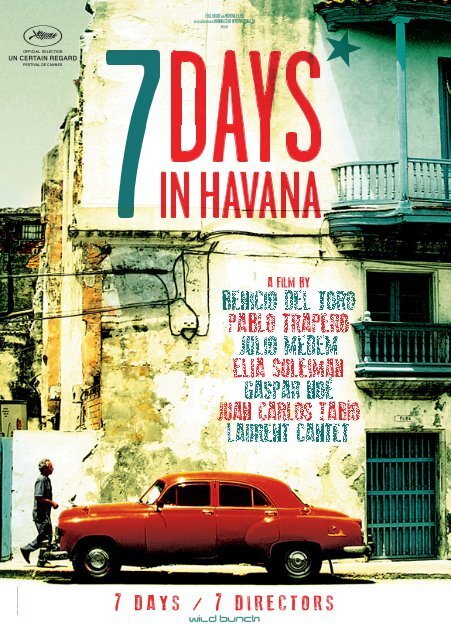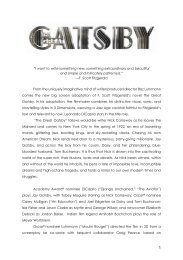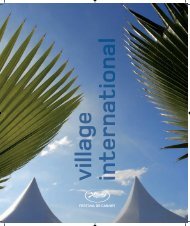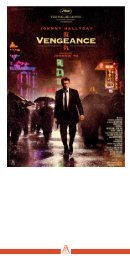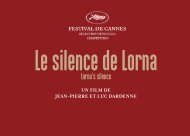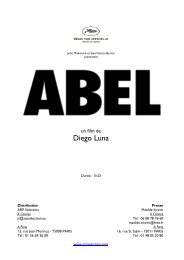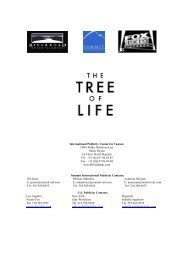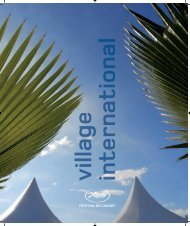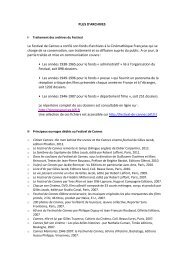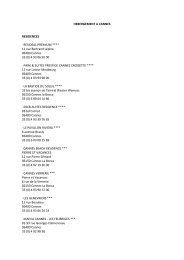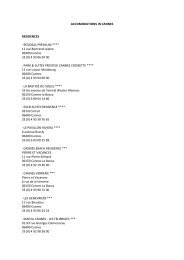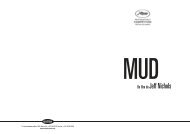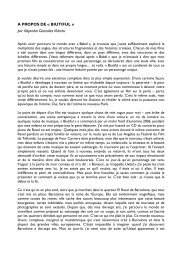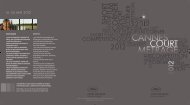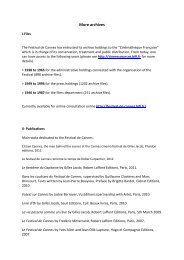Press kit - Festival de Cannes
Press kit - Festival de Cannes
Press kit - Festival de Cannes
Create successful ePaper yourself
Turn your PDF publications into a flip-book with our unique Google optimized e-Paper software.
©FULL HOUSE – MORENA FILMS. CREDITS NOT CONTRACTUAL<br />
FULL HOUSE AND MORENA FILMS<br />
IN COLLABORATION WITH HAVANA CLUB INTERNATIONAL SA<br />
PRESENT<br />
A FILM BY<br />
BENICIO DEL TORO<br />
PABLO TRAPERO<br />
JULIO MEDEM<br />
ELIA SULEIMAN SULEI SULEIMAN MAN<br />
GASPAR NOÉ<br />
JUAN CARLOS TABÍO<br />
LAURENT CANTET<br />
7 DAYS / 7 DIRECTORS
INTERNATIONAL SALES<br />
4 La Croisette – 1st fl oor (In front of the Palais)<br />
Phone: +33 (0) 4 93 30 17 46<br />
Carole BARATON: cbaraton@wildbunch.eu<br />
Gary FARKAS: gfarkas@wildbunch.eu<br />
Vincent MARAVAL: n<strong>de</strong>vi<strong>de</strong>@wildbunch.eu<br />
Gaël NOUAILLE: gnouaille@wildbunch.eu<br />
Silvia SIMONUTTI: ssimonutti@wildbunch.eu<br />
Full House & Morena Films<br />
In collaboration with Havana Club International S.A<br />
present<br />
A fi lm by<br />
BENICIO DEL TORO<br />
PABLO TRAPERO<br />
JULIO MEDEM<br />
ELIA SULEIMAN<br />
GASPAR NOÉ<br />
JUAN CARLOS TABÍO<br />
LAURENT CANTET<br />
Running time: 2h09 – Visa 128.944 – 1.85 – Dolby Digital<br />
Download press <strong>kit</strong> and photos from<br />
www.wildbunch.biz/fi lms/7_days_in_havana<br />
INTERNATIONAL PRESS: RENDEZ VOUS<br />
Viviana ANDRIANI: viviana@rv-press.com<br />
+33 6 80 16 81 39<br />
Aurélie DARD: aurelie@rv-press.com<br />
+33 6 77 04 52 20
7 DAYS IN HAVANA is a snapshot of Havana in 2011: a contemporary portrait<br />
of this eclectic city, vital and forward-looking, told through a single featurelength<br />
movie ma<strong>de</strong> up of 7 chapters, directed by Benicio <strong>de</strong>l Toro, Pablo Trapero,<br />
Julio Me<strong>de</strong>m, Elia Suleiman, Gaspar Noé, Juan Carlos Tabío and Laurent Cantet.<br />
Each director, through his own sensibility, origins, and cinematographic style,<br />
has caught the energy and the vitality that makes this city unique. Some have<br />
chosen to meet cuban reality in tune with its everyday life, through the eyes of<br />
the foreigner far from his familiar points of reference. Others have chosen total<br />
immersion and drawn inspiration from the local people.<br />
Each chapter <strong>de</strong>picts a day of the week through the daily – and extraordinary –<br />
lives of its characters. A world way from the familiar clichés, 7 DAYS IN HAVANA<br />
aims to express the soul of this city and its diverse neighborhoods, atmospheres,<br />
generations and cultures. If the seven stories have different plots, the directors<br />
have accepted to fall within the same common framework and link the stories<br />
together to create a dramatic cohesion. Shared locations play their part:<br />
emblematic Havana landmarks like the Hotel Nacional or the Malecon form the<br />
backdrop for some of the chapters. Some lead and minor characters move from<br />
one film to another, connecting the stories and <strong>de</strong>monstrating that, in Havana,<br />
all layers of society meet, rub shoul<strong>de</strong>rs and sometimes intermingle.
EL YUMA<br />
by BENICIO DEL TORO<br />
Synopsis<br />
Teddy Atkins is a young American tourist who travels to Havana for the first<br />
time. Angelito is a middle-aged Cuban cab driver. Hired by Teddy during his trip,<br />
Angelito will offer him a tour of the city that is anything but traditional…<br />
Director’s notes<br />
The film will present a picture of Havana’s nightlife and its idiosyncrasies. A<br />
night in which Teddy discovers that Havana’s attraction lies in the visceral and<br />
the abstract, once he’s got past the visual shock of its crumbling tenements<br />
and its slow rhythm. A night in which a tourist discovers what Graham Greene<br />
conclu<strong>de</strong>d when he stated that Havana was a city where «anything is possible».<br />
The film will highlight the difficulties in pinning down Havana’s real essence,<br />
intertwined with humorous reflections on the city’s shortcomings. We will witness<br />
Teddy’s metamorphosis, from his initial annoyance at the island’s disor<strong>de</strong>r to his<br />
embracing of the intoxicating Cuban spirit.<br />
Filmography / Benicio <strong>de</strong>l Toro<br />
As Director<br />
2012 7 DAYS IN HAVANA<br />
<strong>Cannes</strong> Film <strong>Festival</strong>, Un Certain Regard<br />
1995 SUBMISSION, short film<br />
As Actor (selected)<br />
2010 THE WOLFMAN - Joe Johnston<br />
2009 CHE - Steven So<strong>de</strong>rbergh<br />
<strong>Cannes</strong> Film <strong>Festival</strong> 2008, Award for Best Actor<br />
Goyas 2009, Best Actor<br />
2004 SIN CITY - Robert Rodriguez, Frank Miller<br />
2003 21 GRAMS - Alejandro González Inárritu<br />
2000 THE PLEDGE - Sean Penn<br />
2000 TRAFFIC - Steven So<strong>de</strong>rbergh<br />
Aca<strong>de</strong>my Awards® 2001, Best Supporting Actor<br />
BAFTA 2001, Best Supporting Actor<br />
Berlin Film <strong>Festival</strong> 2001, Silver Bear<br />
Gol<strong>de</strong>n Globe 2001, Best Supporting Actor<br />
2000 SNATCH - Guy Ritchie<br />
1998 FEAR AND LOATHING IN LAS VEGAS - Terry Gilliam<br />
1995 THE USUAL SUSPECTS - Bryan Singer
JAM SESSION<br />
by PABLO TRAPERO<br />
Synopsis<br />
A well-known director travels to Cuba to receive an award in honor of his career.<br />
More interested in nightlife than celebrity, he strikes up a friendship with his<br />
driver, who happens to be an incredible trumpet player.<br />
Director’s notes<br />
Havana is a mythical city that strikes a particular chord in the hearts of Latin<br />
American directors, and therefore in mine. My first encounter with this city goes<br />
back to 1999 when I came to present my film MUNDO GRÚA at the Havana Film<br />
<strong>Festival</strong>. I’ve been returning regularly ever since.<br />
JAM SESSION is, in a way, a parable of fame. When Emir Kusturica arrives in<br />
Havana, a land out of time, a trigger is activated. He discovers, for the first time<br />
in a long time, a place in which appearances aren’t everything. Just by being in<br />
contact with ordinary people he metamorphoses throughout the story back into<br />
himself. He manages to free himself from the public persona that has overtaken<br />
his being and blurred his bearings. This transformation is largely thanks to<br />
The Driver, a real, raw man as regards his feelings. And we witness the birth of<br />
a beautiful friendship, as natural as it is incongruous, that will allow a lost man<br />
to find himself. The parable reaches its full meaning at the end when the award<br />
received by The Director earlier in the film, an external sign of respectability and<br />
riches, ends up in a toy truck belonging to The Driver’s daughter.<br />
Selected filmography / Pablo Trapero<br />
Feature Films<br />
2012 ELEFANTE BLANCO (WHITE ELEPHANT)<br />
7 DAYS IN HAVANA<br />
<strong>Cannes</strong> Film <strong>Festival</strong>, Un Certain Regard<br />
2010 CARANCHO<br />
<strong>Cannes</strong> Film <strong>Festival</strong>, Un Certain Regard<br />
2008 LEONERA (LION’S DEN)<br />
<strong>Cannes</strong> Film <strong>Festival</strong> 2008, in Competition<br />
2006 BORN AND BRED<br />
2004 FAMILIA RODANTE<br />
Sao Paulo Film <strong>Festival</strong> 2004<br />
2002 EL BONAERENSE<br />
Chicago Film <strong>Festival</strong> 2002, FIPRESCI Award<br />
2001 NAIKOR, LA ESTACIÓN DE SERVICIO (documentary)<br />
1999 CRANE WORLD<br />
Venice Film <strong>Festival</strong> 1999, 2 Special Awards<br />
Rotterdam International Film <strong>Festival</strong> 2000, Tiger Award<br />
Havana Film <strong>Festival</strong> 1999, Jury Award<br />
Short Films<br />
1995 NEGOCIOS<br />
1993 MOCOSO MALCRIADO
CECILIA’S TEMPTATION<br />
by JULIO MEDEM<br />
Synopsis<br />
Leonardo wants to hire Cecilia as a singer and suggests she comes to Spain with<br />
him. She lives with her baseball player boyfriend Jose, who is going through a<br />
major crisis in his professional life. Cecilia will have to make a crucial choice:<br />
to live out her passion and growing love for Leonardo, or to stay in Havana and<br />
support Jose.<br />
Director’s notes<br />
CECILIA´S TEMPTATION features three characters - Cecilia, José and Leonardo<br />
- inspired by the 19th Century novel “Cecilia Val<strong>de</strong>s”, and representative of<br />
Cuban culture. These three characters find themselves involved in a triangular<br />
relationship, driven not only by feelings of love but also by professional<br />
aspirations. Cecilia is a talented singer, Leonardo a Spanish businessman, and<br />
José a young athlete and Cecilia’s boyfriend.<br />
Some of the ingredients, particularly the dramatic tension, were already present<br />
in the novel. But the setting has been mo<strong>de</strong>rnized and is completely current,<br />
as is the structure of the story. I wanted to tell the story from the climax in their<br />
relationship onwards.<br />
When the film begins, Cecilia is at breaking point, facing a life-changing<br />
<strong>de</strong>cision - perhaps the most important of her life - and unable to bear the stress<br />
that accompanies it.<br />
This love triangle is an explicit metaphor, in which José represents Cuba,<br />
her country. Staying with him is a gesture of loyalty, of holding back from<br />
betraying her country and its people... Leonardo, in turn, is the possibility of<br />
working abroad, in Spain. He represents the opportunity of a new life.<br />
Selected Filmography / Julio Me<strong>de</strong>m<br />
2012 7 DAYS IN HAVANA<br />
<strong>Cannes</strong> Film <strong>Festival</strong>, Un Certain Regard<br />
2010 ROOM IN ROME<br />
2007 CHAOTIC ANA<br />
Toronto Film <strong>Festival</strong> 2007, Official Selection<br />
2001 SEX AND LUCIA<br />
Goyas 2002: Best New Actress, Best Original Soundtrack,<br />
and 9 nominations including Best Film, Best Director, Best Cinematography<br />
1998 LOVERS OF THE ARCTIC CIRCLE<br />
Venice Film <strong>Festival</strong> 1998, in Competition<br />
Goyas 1998: Best Editor, Best Original Soundtrack and 2 nominations<br />
(Best Actress and Best Script)<br />
1996 TIERRA<br />
<strong>Cannes</strong> Film <strong>Festival</strong> 1996, in Competition<br />
Goyas 1997: Best Special Effects and Best Original Soundtrack<br />
<strong>Festival</strong> International <strong>de</strong> Sao Paulo 1997, Critics’ Award<br />
1993 THE RED SQUIRREL<br />
<strong>Cannes</strong> Film Fesitval 1993, Directors’ Fortnight, Prix Regard Jeune<br />
Goyas 1994: Best Music and 2 nominations<br />
(Best Actress, Best New Actress).<br />
1992 VACAS<br />
Goyas 1993: Best Director<br />
Tokyo International Film <strong>Festival</strong> 1992, Grand Prix
DIARY OF A BEGINNER<br />
by ELIA SULEIMAN<br />
Synopsis<br />
ES, a Palestinian, arrives in Havana and wan<strong>de</strong>rs the streets of the city while<br />
waiting for an appointment organised by the Palestinian Embassy.<br />
Director’s notes<br />
When I was approached to direct one of the 7 DAYS IN HAVANA by the producers,<br />
I blubbered an answer that was no answer: I don’t speak Spanish, I said, I’ve<br />
never been to Havana, and I know virtually nothing about Cuba. “That could<br />
be interesting too,” they replied. I was invited to fly to Havana to spend a few<br />
days in or<strong>de</strong>r to come back with a <strong>de</strong>finitive answer. I travelled to Havana and<br />
spent exactly four days there. Going through customs on my way out of Cuba,<br />
it occurred to me that I had already started to formulate my <strong>de</strong>finitive answer<br />
after passing customs on my way in. I rehearsed my answer mid-flight trying<br />
various sound bites to <strong>de</strong>termine the tonality of my voice when I would give<br />
my <strong>de</strong>finitive “No”. At a time when the Arab Spring was in full swing, why on<br />
earth would I turn to the opposite direction of the globe to witness a revolution<br />
long-gone and long-institutionalized, I asked myself. If it’s the question of<br />
the drama of the blocka<strong>de</strong>, well, we have Gaza, just a stone’s throw away.<br />
Besi<strong>de</strong>s, I did not find Havana exotic. I felt alienated instead. I met the producers<br />
to give them my reply. With a slip of the tongue as miraculous as it was<br />
metaphysical, and with utter <strong>de</strong>termination, I gave a <strong>de</strong>finitive “Yes”. The rest<br />
is history; a brief yet ten<strong>de</strong>r history, its memory captured in a short film.<br />
Selected Filmography / Elia Suleiman<br />
Feature Films<br />
2012 7 DAYS IN HAVANA<br />
<strong>Cannes</strong> Film <strong>Festival</strong>, Un Certain Regard<br />
2009 THE TIME THAT REMAINS<br />
<strong>Cannes</strong> Film <strong>Festival</strong> 2009, in Competition<br />
2002 DIVINE INTERVENTION<br />
<strong>Cannes</strong> Film <strong>Festival</strong> 2002, in Competition, Jury Prize<br />
Chicago International Film <strong>Festival</strong> 2002, Special Jury Award<br />
1996 CHRONICLE OF A DISAPPEARANCE<br />
Venice Film <strong>Festival</strong> 1996, Luigi <strong>de</strong> Laurentis Award<br />
Rotterdam International Film <strong>Festival</strong> 1997, in Competition<br />
Short Films<br />
2000 CYBER PALESTINE<br />
1990 INTRODUCTION TO THE END OF AN ARGUMENT
RITUAL<br />
by GASPAR NOÉ<br />
Synopsis<br />
After discovering that their daughter is having a homosexual relationship,<br />
her parents <strong>de</strong>ci<strong>de</strong> to have her exorcized.<br />
Director’s notes<br />
Che, the most admired of all my fellow countryman… Fi<strong>de</strong>l, the only man who<br />
succee<strong>de</strong>d in confounding the CIA’s plans for over 50 years… SOY CUBA, the film<br />
whose camerawork inspired me so <strong>de</strong>eply…<br />
But let’s be honest, if I ma<strong>de</strong> this film, it’s because a friend of mine who has<br />
spent some time in Cuba told me that that’s where he had seen the highest<br />
percentage of the most gorgeous girls and best dancers in the world.<br />
I hate tourism; I had to wait for years for a credible excuse to take a flight to the<br />
mythical island. Having missed the screening of IRREVERSIBLE at the Havana<br />
Film <strong>Festival</strong> in 2002, I had to wait until the end of 2009 and the selection of<br />
ENTER THE VOID to go. At the same time, some of the producers had already<br />
approached me with 7 DAYS IN HAVANA in mind. As a result, after partying for<br />
3 days I agreed to it. But I also realised that today’s social reality was more<br />
complex than the Castroist utopia whose virtues my father praised, and that the<br />
Cuban imagination was more closely linked to African magic than I’d thought.<br />
A year and a half later, I returned to Cuba to shoot in a semi-improvised manner,<br />
with an ultra-reduced crew, a short film with a dance scene and a ‘cleansing’<br />
ritual.<br />
Selected Filmography / Gaspar Noé<br />
Feature Films<br />
2012 7 DAYS IN HAVANA<br />
<strong>Cannes</strong> Film <strong>Festival</strong>, Un Certain Regard<br />
2009 ENTER THE VOID<br />
<strong>Cannes</strong> Film <strong>Festival</strong> 2009, Competition<br />
Sitges 2009, Best Cinematography and Special Jury Awards<br />
2002 IRREVERSIBLE<br />
<strong>Cannes</strong> Film <strong>Festival</strong> 2002, Competition<br />
1998 I STAND ALONE<br />
<strong>Cannes</strong> Film <strong>Festival</strong> 1998, Critics’ Week<br />
Sitges 1999, Best Script<br />
Short Films<br />
2006 SIDA (from the short film collection 8)<br />
2006 WE FUCK ALONE (from the short film collection DESTRICTED)<br />
2005 EVA (series of three short films)<br />
1991 CARNE
DULCE AMARGO<br />
by JUAN CARLOS TABÍO<br />
Synopsis<br />
Mirta Gutierrez is a psychologist. She appears one afternoon a week on a television<br />
show where she gives advice on personal <strong>de</strong>velopement. Mirta <strong>de</strong>votes most of<br />
her free time to making pastries, to generate the money nee<strong>de</strong>d to maintain her<br />
home and support her family. On this particular day, she receives a major or<strong>de</strong>r<br />
from a special customer…<br />
DIRECTOR’S NOTES<br />
Dulce Amargo (SWEET AND SOUR) is an oxymoron. Because things are what they<br />
are and also their opposite. What is said is not always what is done. Nothing is<br />
more harrowing than creating our own happiness. DULCE AMARGO tells the story<br />
of a day in the life of Mirta and Daniel. Mirta is a psychologist who finds herself<br />
having to make pastries so she can sell them (not to supplement her income but<br />
to have an income). Daniel is a retired lieutenant colonel (I don’t know if he is<br />
retired because he is an alcoholic or if he has become an alcoholic after retiring).<br />
DULCE AMARGO is one of seven possible stories taking place in the reality of<br />
contemporary Havana. And REALITY, as we all know, is another form of fiction.<br />
Selected Filmography / Juan Carlos Tabío<br />
Feature Films<br />
2012 7 DAYS IN HAVANA<br />
<strong>Cannes</strong> Film <strong>Festival</strong>, Un Certain Regard<br />
2008 EL CUERNO DE LA ABUNDANCIA<br />
Havana Film <strong>Festival</strong> 2008, Best Script<br />
Cartagena Film <strong>Festival</strong> 2009, Special Jury Award<br />
2000 THE WAITING LIST<br />
Goyas 2001: Nomination for Best Spanish-speaking Film<br />
Havana Film <strong>Festival</strong> 2000, Best Script<br />
Cartagena Film <strong>Festival</strong> 2001, Best Supporting Role, nomination for<br />
Best Film<br />
1995 GUANTANAMERA<br />
Sundance Film <strong>Festival</strong> 1996<br />
Latin American Cinema Award<br />
Venice Film <strong>Festival</strong> 1995, Competition<br />
Havana Film <strong>Festival</strong>, 2nd Award<br />
1993 STRAWBERRY AND CHOCOLATE<br />
Aca<strong>de</strong>my Awards®1995: Best Foreign Language Film nominee<br />
Berlin Film <strong>Festival</strong> 1994, Competition, Silver Bear and Best Film<br />
Sundance Film <strong>Festival</strong> 1995, Special Jury Award<br />
Goyas 1995: Best Foreign Film in Spanish Language<br />
Havana Film <strong>Festival</strong>, 8 awards including the Audience Award, Best<br />
Director, Best Actor)
LA FUENTE<br />
by LAURENT CANTET<br />
Synopsis<br />
Martha lives in an old apartment on the first floor of a crumbling building.<br />
In the middle of her sitting room sits an imposing, multi-colored statue of Oshun,<br />
the Virgin Mary. Following a dream in which she saw Oshun, Martha <strong>de</strong>ci<strong>de</strong>s to<br />
organize a ceremony in Her honour and asks all the tenants of her building to<br />
help her build a fountain as <strong>de</strong>man<strong>de</strong>d by the divinity.<br />
Director’s notes<br />
While on a previous trip to Havana to scout locations for another film, we pushed<br />
open the door of a building on the Malecon and were received by Nathalia,<br />
a very pleasant and vivacious woman in her sixties, dressed in workman’s clothes,<br />
who invited us in to visit her apartment. Insi<strong>de</strong>, the main room was buzzing with<br />
activity. Five or six people were busy building a strange sort of pond that had to<br />
be ready a few days later. The statue of Oshun reigned briefly in a bedroom, but<br />
was soon to be installed on a pe<strong>de</strong>stal in the middle of the small pool that the<br />
bricklayers were tiling.<br />
Natalia, a Santeria priestess, was preparing a ceremony to celebrate the fifteenth<br />
anniversary of her initiation. It seemed as if all the neighbors had come together<br />
for the occasion, and they worked as one with a joy that both amused me and<br />
ma<strong>de</strong> me want to film everything that was happening. I soon realized that<br />
what I was witnessing was a perfect allegory of Cuban society, where nothing<br />
is possible but in which everything always turns out OK thanks to imagination,<br />
enthusiasm, smarts and all sorts of odds and ends. And let us not forget mutual<br />
aid and solidarity.<br />
I quickly finalized the screenplay, and the time constraints (action squeezed<br />
into one day) immediately enriched the situation, creating a sense of emergency<br />
favorable to the most invigorating comicality. This is the first time I have tackled<br />
a genre I wasn’t familiar with: comedy. And it was an immense pleasure,<br />
pushing the situations to the brink of farce. I immediately wanted Nathalia<br />
to play the lead role. I had only met her for a brief moment but enough to be<br />
conquered by her vivacity and her charisma. When we met the second time,<br />
she hesitated for about 30 seconds before she accepted then, with her gravelly<br />
voice, as in the first scene of the film, called her neighbors in the stairwell.<br />
In a few minutes she had gathered all those who were present for the construction<br />
of the fountain: the bricklayers, the women, the children… the i<strong>de</strong>al casting in<br />
fact. And in a general good humor that conquered me completely, we did a few<br />
tests where everybody replayed their own role while adopting with pleasure the<br />
directions I suggested, without any shyness in front of the camera and surprising<br />
ease and most of all lots of enjoyment. I was going to be able to shoot the way<br />
I like, with non-professional actors and leave lots of room for improvisation.<br />
A film that combines documentary and “genre” (in this case, comedy). A film that<br />
allows you to see faces you never see in cinema, to hear voices you never hear.<br />
And which above all will give a voice to those who are so rarely heard.<br />
Selected Filmography / Laurent Cantet<br />
Feature Films<br />
2012 7 DAYS IN HAVANA <strong>Cannes</strong> Film <strong>Festival</strong>, Un Certain Regard<br />
FOX FIRE<br />
2008 THE CLASS<br />
<strong>Cannes</strong> Film <strong>Festival</strong> 2008, Palme d’Or<br />
Aca<strong>de</strong>my Awards® 2009 Best Foreign Language film nomination<br />
2005 HEADING SOUTH<br />
Venice Film <strong>Festival</strong> 2005,<br />
Marcello Mastroianni Award and Cinemavvenire Award<br />
2001 TIME OUT Venice Film <strong>Festival</strong> 2001, Don Quixote Award<br />
1999 RESSOURCES HUMAINES<br />
Césars 2001: Best First Feature Film and Best Promising Actor<br />
Short Film<br />
1995 JEUX DE PLAGE
LEONARDO PADURA<br />
Screenplay coordinator<br />
Born in 1955, Leonardo Padura Fuentes is a journalist, scriptwriter and novelist<br />
from the generation who grew up during the revolution. Through his novels he<br />
<strong>de</strong>scribes contemporary Cuban society and the daily life of Havana’s inhabitants.<br />
The novels that built his reputation inclu<strong>de</strong> “Havana Gold”, “Adios Hemingway”,<br />
“Havana Red” and “Cuatros Estaciones”. He has, among others, created the<br />
character of Mario Con<strong>de</strong>. One of the most wi<strong>de</strong>ly known Cuban authors worldwi<strong>de</strong>,<br />
his novels have been translated into English, French, Italian, Portuguese and<br />
German.<br />
INTERVIEW WITH LEONARDO PADURA<br />
Who did you work with on the screenplays for 7 DAYS IN HAVANA?<br />
How did you choose your co-writers and why?<br />
In the beginning, I worked with my wife, Lucía López Coll. We wrote 11 proposals<br />
and two other Cuban writers wrote another ten. I chose Lucia because she’s<br />
familiar with cinema (she has worked as an assistant and has directed her<br />
own short films for ten years). Moreover, when it comes to film, I don’t like to<br />
work on my own. For my novels, I can’t even imagine writing with someone else,<br />
whereas for film, I can’t imagine writing alone. Among the 11 proposals that<br />
we submitted to the producers, four were accepted for the film. Beyond that my<br />
work has consisted of integrating the seven stories into one common plot with<br />
the recurring characters you find in a few segments and keep evolving from one<br />
day to another.<br />
We feel very strongly that the stories for 7 DAYS were written to be<br />
filmed. In your opinion, what is particular to writing for the cinema?<br />
It’s true that these stories were written for film. In this particular case, it was<br />
even more complicated because we had to cut them down to between 12 and 14<br />
pages to get 15 minutes of film, and the synthesis of the conflicts was even more<br />
important. So the screenplay had to take into account both the time and the other<br />
requirements specific to cinema: what the producers want, what the directors<br />
want and what can actually be filmed. These concepts are totally foreign to<br />
literature. In writing for cinema, the writer only appears during the dialogues,<br />
which can be transposed from paper to film. From a stylistic point of view, the<br />
rest is of no interest. All <strong>de</strong>pends on the subject and not on the beauty of the<br />
language.<br />
Can you tell us in a few words what 7 DAYS IN HAVANA is about?<br />
It’s about different ways of seeing Havana: from the insi<strong>de</strong>, from the outsi<strong>de</strong>,<br />
very close-up or through the amazed eyes of those discovering it for the first time.<br />
The film <strong>de</strong>als with a Havana that is multi-faceted and singular at the same<br />
time, where many lives coexist and are in some way related. It speaks of a city<br />
that dies and rises up once again. It speaks of my city.<br />
How did you manage to avoid the stereotypes of Havana: the cars,<br />
the music, the cigars, Che, fast girls…<br />
I did everything I could. That’s why you don’t see any of that in the short films of<br />
Tabio and Trapero. They may appear in the other films since they are part of the<br />
reality and <strong>de</strong>eply rooted in the minds of the directors and many other people<br />
when they think of Cuba.<br />
Another stereotype often found in films is the city treated as a<br />
character…<br />
In this case, it is not a character we’re talking about but a scenario repeating<br />
itself. And since Havana is such a special city, its scope is essential to the<br />
<strong>de</strong>velopment of the different stories.
CAST<br />
with<br />
JOSH HUTCHERSON<br />
VLADIMIR CRUZ<br />
EMIR KUSTURICA<br />
ALEXANDER ABREU<br />
DANIEL BRÜHL<br />
MELVIS ESTÉVEZ<br />
ELIA SULEIMAN<br />
CRISTELA DE LA CARIDAD HERRERA<br />
MIRTHA IBARRA<br />
JORGE PERUGORRÍA<br />
NATHALIA AMORE<br />
CREW<br />
Directed by<br />
BENICIO DEL TORO, PABLO TRAPERO, JULIO MEDEM, ELIA SULEIMAN,<br />
GASPAR NOÉ, JUAN CARLOS TABÍO and LAURENT CANTET<br />
Production<br />
FULLHOUSE & MORENA FILMS<br />
In collaboration with<br />
HAVANA CLUB INTERNATIONAL SA<br />
In association with<br />
BACKUP FILMS, SOFICA COFICUP, PALATINE ETOILE 8 & 9,<br />
M&C SAATCHI GAD and CHAOCORP DISTRIBUTION<br />
With the collaboration of<br />
ICAA and the participation of CANAL + FRANCE<br />
Sound<br />
EVA VALIÑO, CHARLY SCHMUKLER, NICOLAS DE POULPIQUÉT<br />
Original Music<br />
XAVI TURULL with the collaboration of DESCEMER BUENO and KELVIS OCHOA<br />
Dp DANIEL ARANYÓ (AEC) et DIEGO DUSSUEL<br />
Executive Producers<br />
CRISTINA ZUMÁRRAGA and PILAR BENITO<br />
Produced by<br />
ALVARO LONGORIA, GAËL NOUAILLE, LAURENT BAUDENS, DIDAR DOMEHRI,<br />
FABIEN PISANI<br />
Screenplay and script coordinators<br />
LEONARDO PADURA and LUCÍA LÓPEZ COLL<br />
World Sales<br />
WILD BUNCH
©FULL HOUSE – MORENA FILMS. CREDITS NOT CONTRACTUAL


